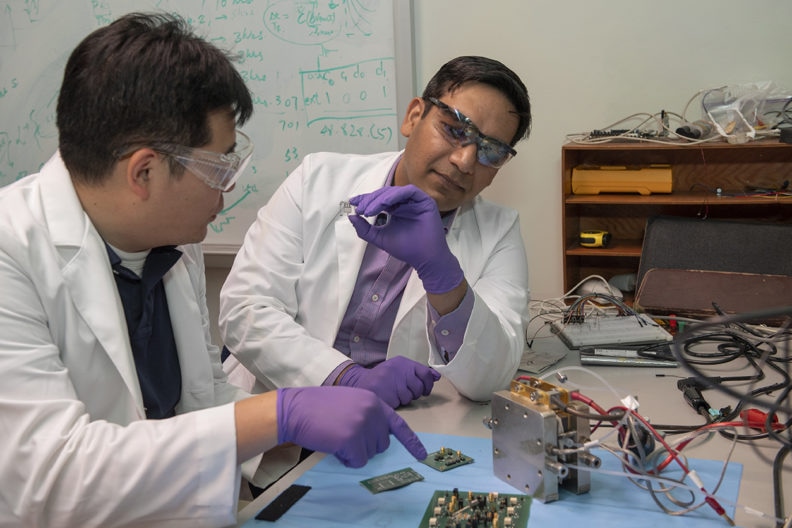Sep 28 2018
Washington State University Scientists have created an implantable, biofuel-powered sensor that is capable of functioning on sugar and monitoring a body’s biological signals to detect, prevent, and diagnose illnesses.
 Su Ha, Subhanshu Gupta, l-r, examine a biofuel cell. Credit: Washington State University
Su Ha, Subhanshu Gupta, l-r, examine a biofuel cell. Credit: Washington State University
A cross-disciplinary study group led by Subhanshu Gupta, assistant professor in WSU’s School of Electrical Engineering and Computer Science, developed the unique sensor, which, enabled by the biofuel cell, harvests glucose from body fluids to function.
The study team has shown a unique incorporation of the biofuel cell with electronics to process biochemical and physiological signals with high sensitivity.
Their research recently was reported in the IEEE Transactions on Circuits and Systems journal.
Professors Su Ha and Alla Kostyukova from the Gene and Linda School of Chemical Engineering and Bioengineering led the biofuel cell’s designing.
Many common sensors for disease detection are either watches, which have to be recharged, or patches that are worn on the skin, which are superficial and cannot be embedded. On the other hand, the WSU sensor could also eliminate the need to prick a finger for testing of some diseases, such as diabetes.
“The human body carries a lot of fuel in its bodily fluids through blood glucose or lactate around the skin and mouth,” said Gupta. “Using a biofuel cell opens the door to using the body as potential fuel.”
The electronics in the sensor use advanced design and fabrication to use up only a few microwatts of power while being extremely sensitive. Coupling these electronics with the biofuel cell renders it more efficient than traditional battery-powered devices, described Gupta. Since it depends on body glucose, the sensor’s electronics can be powered for the foreseeable future. So, for example, the sensor could work on sugar formed right under the skin.
In contrast to the universally used lithium-ion batteries, the biofuel cell is also totally non-toxic, making it more promising as an implant for humans, he said. It is also more sensitive and stable than conventional biofuel cells.
The scientists say their sensor could be produced economically through mass production, by leveraging economies of scale.
While the sensors have been laboratory tested, the team is hoping to test and validate them in blood capillaries, which will necessitate regulatory approval. The WSU scientists are also working on further enhancing and boosting the power output of their biofuel cell.
“This brings together the technology for making a biofuel cell with our sophisticated electronics,” said Gupta. “It’s a very good marriage that could work for many future applications.”
The study team also included Yuehe Lin, Annie Du from the School of Mechanical and Materials Engineering, and Martin Schiavenato, formerly with WSU’s College of Nursing and now with Walden University.
The project to create the sensor was sponsored by a WSU Grand Challenges seed grant.